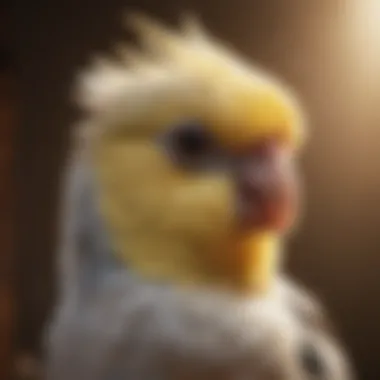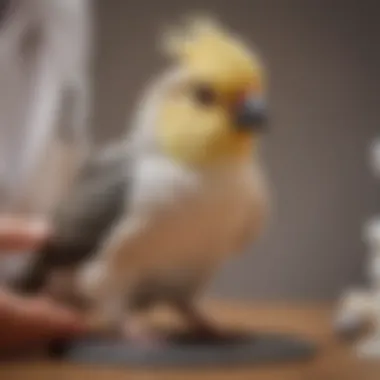Recognizing Symptoms of Sickness in Cockatiels


Intro
Cockatiels are charming companions, bringing joy and companionship to many households. However, like any pet, they can fall ill. Understanding the symptoms of sickness in cockatiels is crucial for pet owners. Early recognition can lead to prompt veterinary care, which often makes a significant difference in outcomes. This knowledge empowers owners to care for their feathered friends better.
In the following sections, we will explore various aspects of cockatiel health. From understanding common symptoms to essential care practices, we aim to provide a comprehensive guide. Knowing what to look for and how to respond can enhance the well-being of your cockatiel, fostering a long and happy life together.
Pet Care and Grooming
Importance of Regular Care
Regular care is vital for maintaining a cockatiel's health. Grooming helps in monitoring their physical condition and prevents various issues. A well-groomed cockatiel is often healthier and happier. It is advisable to establish a grooming routine that includes feather maintenance, nail trimming, and beak care. This will not only keep your pet looking good but also ensure that they are comfortable.
Grooming Techniques by Pet Type
Every type of pet requires specific grooming techniques. For cockatiels, the focus is primarily on the feathers and beak. Regular feather checks can help spot any abnormalities, such as missing feathers or excessive dirt. A soft toothbrush can be used to clean the beak gently, ensuring it remains in good shape.
Tools and Products Recommendations
Investing in the right tools is key.
- Nail Clippers: Specialized bird nail clippers are essential for safe trimming.
- Soft Brushes: A soft brush aids in feather maintenance, helping to remove loose feathers.
- Beak Grinders: These can prevent overgrowth of the beak, which is important for eating and health.
Seasonal Care Tips
Cockatiels may require different care routines based on the season. In winter, ensure they have a warm environment. In summer, keep them safe from heat. Fresh water and a varied diet are crucial year-round. Pay attention to change in behavior during seasons, as this can indicate discomfort or illness.
Health and Nutrition
Understanding Pet Nutrition
Optimal nutrition fuels your cockatiel's health. A balanced diet includes seeds, pellets, and fresh fruits and vegetables. Knowing the right proportions is key to preventing obesity and other health issues.
Common Health Issues by Species
Cockatiels can face several common health problems:
- Psittacosis: A bacterial infection that affects feathers and breathing.
- Avian Gastric Yeast Infection: This can lead to weight loss and lethargy.
- Neoplasia: Tumors can occur and need immediate veterinary attention.
Preventive Care and Regular Check-Ups
Regular check-ups are important to ensure your cockatiel remains healthy. A veterinarian experienced with birds can provide valuable insights into preventive care. Vaccinations and routine tests can help in identifying early signs of illness.
Food and Dietary Advice
Ensure a varied diet consisting of high-quality pellets, seeds, and fresh produce. Avoid offering too many treats high in sugar or fat, as they can lead to health complications. Fresh water should always be available.
Behavioral Training
Basics of Positive Reinforcement
Positive reinforcement is a critical part of cockatiel training. Rewarding good behavior with treats or praise encourages repetition of that behavior. Understanding your bird's personality helps tailor methods for better results.
Training Techniques Users Can Apply
There are several techniques owners can use:
- Target Training: Use a stick or finger to guide your cockatiel to desired locations.
- Step-Up Training: Encouraging your bird to step onto your finger or hand can build trust.
Managing Behavioral Issues
Cockatiels, like any pet, can have behavioral problems. For instance, screaming or biting can happen due to fear or lack of attention. Understanding the triggers can help manage these behaviors effectively.
Importance of Socialization
Socializing your cockatiel is vital for their mental health. Interaction with people and toys promotes happiness. Without proper social exposure, birds can become lonely, leading to stress-related behavior.
Engaging Activities and Enrichment
Fun Games to Play with Your Pet


Cockatiels thrive on stimulation. Simple games like hide and seek with toys or encouraging them to interact with mirrors can be enjoyable. This not only provides entertainment but also strengthens your bond.
DIY Toys and Activities
Creating DIY toys can be both fun and economical. Use safe materials like cardboard or untreated wood. Hanging toys or foraging challenges can keep your cockatiel mentally stimulated.
Importance of Mental Stimulation
Mental stimulation is just as important as physical activity. Regular interaction, puzzles, and new toys can prevent boredom. An engaged cockatiel is typically more content and healthy.
Outdoor Adventures and Exploration
Whenever possible, allow your cockatiel some time outdoors. Ensure safety and supervision to prevent escape or exposure to predators. Outdoor time can enhance their quality of life significantly.
Resources and Community Engagement
Recommended Books and Websites
There are several resources available for pet owners:
- The Parrot Handbook: Offers insights on care and health.
- Birds USA: A website with extensive information on various bird species.
Forums and Groups for Pet Owners
Joining forums such as Reddit's bird community can provide support. Sharing experiences with other cockatiel owners fosters a sense of community.
Finding Local Services and Classes
Look for local avian vets and training classes. These can enhance your skills and ensure your pet receives professional care.
Encouraging Community Sharing and Contributions
Sharing knowledge and experiences enriches the pet owner community. Encouraging dialogue about cockatiel health can raise awareness and promote better care practices within communities.
Preface to Cockatiel Care
Caring for a cockatiel involves understanding their needs, behaviors, and potential health issues. These small parrots are lively companions but can also be susceptible to various health problems. Recognizing the symptoms of sickness early can make a significant difference in the well-being of your cockatiel. This article aims to provide comprehensive insights into managing cockatiel health by focusing on crucial details regarding care and common ailments.
The Importance of Recognizing Symptoms
Understanding sickness symptoms in cockatiels is essential for timely intervention. These birds often hide their ailments well, a trait that can make it hard for owners to notice issues until they become severe. Early identification of symptoms not only helps in addressing the problem but also enhances the overall care approach. By knowing what to look for, pet owners can take proactive steps, minimizing the risk of serious illness, or even fatality.
Moreover, this knowledge fosters a deeper bond between the owner and the pet. A keen observer of their cockatiel's behavior and physical condition is more likely to provide a nurturing environment, which can significantly improve the pet's quality of life. In essence, recognizing symptoms is not just about being reactive; it is also about cultivating a holistic approach toward cockatiel health.
Common Health Issues in Cockatiels
Cockatiels can experience various health problems throughout their lives. Awareness of these issues can guide owners in providing appropriate care. Some common health issues include:
- Respiratory infections: These can be caused by bacteria, viruses, or environmental factors and often manifest in sneezing or difficulty breathing.
- Nutritional deficiencies: An imbalanced diet may lead to obesity or malnourishment, which can affect overall health.
- Avian tuberculosis: This is a contagious disease that affects the digestive system and is caused by a bacterium that can be serious, even fatal, if not treated.
- Feather plucking: This behavioral issue often points to stress or underlying health conditions.
- Egg binding: A common problem in females, where an egg becomes stuck in the reproductive tract.
Awareness of these health issues allows cockatiel owners to create appropriate environmental conditions and check for symptoms regularly. Ensuring that you provide a balanced diet, fresh water, and a clean living space will further aid in preventing many health concerns for your feathered friend.
General Symptoms of Sickness
Recognizing general symptoms of sickness in cockatiels is crucial for the well-being of these birds. Early detection often leads to a better chance of recovery. These symptoms can provide insight into the overall health of the cockatiel. Therefore, understanding them empowers owners to act quickly should any issues arise.
Behavioral Changes
Tameness and Interaction Decrease
A notable sign of illness in cockatiels is a decrease in tameness and interaction. Cockatiels are social creatures that thrive on interaction with their owners. When they pull away or show reluctance to engage, it can indicate underlying health problems. This change in behavior is significant because it breaks the bond between pet and owner, which can lead to increased stress for both parties. Recognizing this symptom early can help lead to prompt action, ensuring the cockatiel receives the necessary attention.
Withdrawal from Socialization
Another critical sign to watch for is withdrawal from socialization. Cockatiels typically enjoy socializing with other birds or people. A sudden disinterest in these interactions suggests that something may be wrong. Owners should note that this withdrawal can indicate mental distress as well as physical illness. If a cockatiel behaves differently than normal, it can signal a health concern that must not be overlooked. Addressing this change in behavior quickly is advisable to keep the bird healthy.
Inactivity and Lethargy
Inactivity and lethargy are also key behavioral changes that can indicate sickness. An active cockatiel will engage in play and exploration; a lack of such activities points to possible illness. Noticing these changes can be the first step in identifying health problems. Inactivity can lead to further complications if left unaddressed, as birds need to exercise to stay healthy.


Physical Symptoms
Changes in Feathers and Plumage
Changes in feathers and plumage are one of the most visible signs of illness. Healthy cockatiels have vibrant and smooth feathers. If the feathers appear dull, unkempt, or if there are bald patches, this is a clear sign that something is amiss. This change might be the result of factors such as poor nutrition or underlying medical issues. Owners should monitor their cockatiel's plumage closely. Noticing these changes can facilitate early intervention, which can positively impact overall health.
Weight Loss and Change in Body Condition
Weight loss and change in body condition is another important symptom to consider. Sudden weight loss can indicate various health issues, including digestive problems. It is essential for owners to weigh their cockatiels regularly. Maintaining awareness of weight changes can be beneficial for the bird's health. Weight loss can lead to a weakened immune system. Thus, recognizing this symptom early can ensure proper veterinary care is sought.
Respiratory Issues
Respiratory issues, such as noisy breathing or labored respiration, are critical to note. Cockatiels may exhibit these signs when they are suffering from infections or environmental stressors. Early detection of respiratory issues is crucial, as these can worsen rapidly. Owners should not dismiss changes in breathing patterns. Addressing respiratory symptoms promptly is vital, as they indicate a significant health concern.
Specific Sickness Indicators
Identifying specific sickness indicators in cockatiels is crucial for diagnosing health problems accurately. These indicators help pet owners understand the underlying issues affecting their birds. Knowledge of these signs can result in timely medical intervention, potentially saving a bird's life. An informed owner is a better caretaker. Understanding how to spot these sickness indicators fosters a proactive approach to cockatiel health and welfare.
Respiratory Distress
Noisy Breathing
Noisy breathing in cockatiels may be a sign of respiratory distress. This symptom is characterized by sounds such as wheezing, clicking, or labored breathing, which are not typical. Recognizing this can indicate potential blockage or inflammation in the airways. Early identification encourages prompt veterinary consultation, which can lead to effective treatment. The unique feature of noisy breathing lies in its variety; it may stem from allergens, infections, or other issues. Paying attention to this sign is beneficial as it can prevent worsening conditions.
Excessive Sneezing or Coughing
Excessive sneezing or coughing can signal respiratory problems in cockatiels. This symptom usually entails frequent sneezing fits or honking cough-like sounds. They might indicate irritation in the nasal passages or throat, often due to environmental factors or infections. Recognizing excessive sneezing or coughing can lead to a better understanding of the cockatiel's well-being. Its unique aspect is its capacity to point towards specific irritants, enabling owners to address environment-related issues. Monitoring this symptom is essential since chronic instances could lead to serious health concerns.
Gastrointestinal Problems
Diarrhea and Abnormal Droppings
Diarrhea and abnormal droppings can reveal gastrointestinal distress in cockatiels. This condition usually involves drastic changes in stool consistency or color. It often indicates dietary issues, parasites, or infections. Observing these changes can aid in the early detection of gastrointestinal health problems. The key characteristic is the observable change in droppings, making it a practical indicator for owners. Abnormal droppings lead to better awareness of potential dietary concerns and can help with swift action.
Vomiting and Regurgitation
Vomiting and regurgitation may present as additional gastrointestinal symptoms. The difference lies in the nature of what is expelled; vomiting involves the contents of the stomach, while regurgitation is often undigested food. Both symptoms can indicate dietary indiscretion, infections, or stress. Their key feature is the similarity, which causes confusion among pet owners. Noticing either symptom is critical, as continued episodes require veterinary attention to avoid dehydration or nutritional deficiencies.
Neurological Symptoms
Unusual Head Tilting
Unusual head tilting in cockatiels can suggest neurological issues. This symptom often indicates an underlying imbalance or discomfort. A bird that tilts its head may also display other signs such as difficulty balancing or coordination problems. This symptom is noteworthy as it often requires an experienced veterinarian to assess, leading to more accurate diagnoses. Understanding the significance of head tilting helps ensure timely intervention in potential cases of infection or injury to the nervous system.
Seizures or Tremors
Seizures or tremors may arise as a serious neurological symptom in cockatiels. These signs include sudden muscle contractions or uncoordinated movements. They may result from various causes, such as toxins, injuries, or underlying diseases. The key aspect of this symptom is the alarming nature, prompting immediate veterinary attention. Recognizing seizures or tremors is critical as they can indicate severe health threats. Awareness of these symptoms allows owners to act quickly, ensuring the health and safety of their birds.
The Role of Environment in Health
The health and well-being of cockatiels are intricately linked to their environment. An appropriate habitat can greatly reduce the likelihood of illness and promote a flourishing life for these birds. Understanding the various aspects of a healthy living space is essential for any cockatiel owner. The elements of clean housing, optimal temperature and humidity, and providing adequate social and mental stimulation contribute significantly to the overall health of your feathered companion.
Importance of Clean Housing
Maintaining a clean living space is fundamental for preventing cockatiel sickness. Birds are sensitive creatures; they can easily fall victim to harmful bacteria and parasites if their surroundings are neglected. Regular cleaning of the aviary, including perches, food dishes, and water containers, is especially important. Waste left uncleaned can harbor microorganisms that lead to illness.
Consider these cleaning practices:
- Daily cleaning: Remove uneaten food and waste.
- Weekly deep clean: Wash toys, perches, and all surfaces with mild detergents. Rinse thoroughly to prevent residue that may harm the bird.
- Disinfecting: Use aviary-safe disinfectants periodically to minimize risks of infections.
A clean environment is an indispensable pillar of disease prevention in birds. Regular upkeep ensures a healthier living space and reduces stress for your cockatiel.
Temperature and Humidity Factors
Cockatiels have specific temperature and humidity preferences that must be met to ensure their health. These birds are native to Australia, thriving in warm and mild conditions. If temperatures drop too low or humidity levels are inappropriate, cockatiels can suffer from respiratory distress and other health issues.
Key considerations for temperature and humidity include:


- Optimal temperature: Ideally, maintain indoor temperatures between 70°F and 80°F. Avoid rapid fluctuations.
- Humidity levels: Humidity should ideally be maintained between 40% and 60%. Too low humidity can lead to dry skin and feather issues, while too high may promote fungal growth.
- Draft protection: Ensure that the cockatiel's cage is placed away from drafty areas, as sudden cold gusts can jeopardize their well-being.
Social and Mental Stimulation
Cockatiels are highly social animals that require both physical and mental stimulation to thrive. A lack of interaction can lead to boredom, which may manifest in behavioral problems or even stress-induced health issues. It is vital to provide a stimulating environment that encourages natural behaviors.
Strategies for enhancing social and mental stimulation include:
- Interactive toys: Rotate toys regularly to keep your cockatiel engaged. Items that challenge their problem-solving skills can be particularly beneficial.
- Quality time: Spend time with your bird daily. Talking, singing, or allowing free-flying time can strengthen your bond and contribute to their overall happiness.
- Companionship: If your lifestyle allows, consider having more than one cockatiel. Birds often thrive in pairs or small groups, which can help mitigate loneliness.
Incorporating these considerations not only enriches the life of your cockatiel but also plays a crucial role in preventing sickness. A healthy environment fosters a resilient bird and promotes their overall wellness.
Recognizing Urgency
Recognizing urgency in your cockatiel's health is vital for ensuring they receive prompt and appropriate care. Timely intervention can mean the difference between a minor issue and a serious medical condition. Understanding the signs of distress allows pet owners to act swiftly. There is a certain peace of mind that comes from knowing when it is critical to seek veterinary help.
When to Consult a Veterinarian
Acute Symptom Onset
Acute symptom onset refers to health issues that suddenly arise, which can indicate an immediate problem with your cockatiel. This is characterized by noticeable changes in behavior or physical condition that occur rapidly. For example, if your previously active cockatiel suddenly becomes lethargic or shows difficulty breathing, this demands urgent attention. Acute symptoms are significant contributors to the overall discussion in this article due to their alarming nature. The urgency behind acute symptoms often ensures that pet owners prioritize their birds’ health, leading to prompt veterinary consultations. Addressing acute onset of issues can indeed enhance the odds for a better recovery.
Persistent Symptoms Over Time
On the other hand, persistent symptoms over time signal ongoing health issues that should not be overlooked. When a cockatiel exhibits symptoms such as prolonged lack of appetite or continuous sneezing over several days or weeks, it is crucial to consult a vet. This situation implies that the underlying problem might be chronic, requiring a careful assessment to provide the right treatment. The importance of recognizing persistent symptoms is aligned with preventive care goals, promoting long-term wellness. These consistent indicators often encourage owners to monitor their pets closely, which can be beneficial in managing their health effectively.
Emergency Situations
Some situations are deemed emergencies. Cockatiel owners must be equipped to identify when their pet faces a life-threatening scenario. Even minor accidents, such as falling from a height or potential poisoning from ingesting harmful substances, necessitate immediate veterinary action. Additionally, signs of severe respiratory distress or extreme lethargy merit urgent attention. The capacity to recognize such emergency situations not only safeguards your cockatiel’s life but also fosters responsible pet ownership.
"Understanding when to act can transform your approach to your bird’s health. It is essential to stay observant and tuned in to any changes."
Maintaining awareness of the urgent signs your cockatiel may exhibit empowers you as an owner. In the realm of avian health, delay can often equate to risk, emphasizing the importance of quick decision-making when it comes to your pet's wellbeing.
Preventative Care Strategies
Preventative care strategies play a crucial role in maintaining the health of cockatiels. By focusing on early detection and proper management of potential issues, care can greatly enhance the quality of life for these birds. Pet owners must recognize the significance of these practices to avoid costly veterinary interventions later on.
Regular Check-Ups
Regular veterinary check-ups are essential for ensuring the overall health of cockatiels. Just like humans, these birds can develop health problems that may not be immediately visible. Annual check-ups enable vets to monitor the cockatiel’s weight, plumage, and overall condition, allowing for early detection of any abnormalities. During these visits, a comprehensive evaluation of the bird's health can be done, which may include:
- Physical examination to assess body condition and feather quality.
- Blood tests to check for underlying infections or diseases.
- Parasite screenings to detect any infestations that could impact health.
These regular examinations will also provide an opportunity for pet owners to ask questions regarding their cockatiel’s behavioral or dietary needs.
Balanced Diet and Nutrition
A balanced diet is a vital aspect of preventative care. Cockatiels require a varied diet to maintain optimal health. A nutritional diet includes a blend of high-quality pellets, fresh fruits, and vegetables. Avoiding excessive treats is important, as this can lead to obesity and other weight-related issues. Key components of a balanced diet include:
- Pellets: They should comprise the bulk of the diet, as they contain essential nutrients.
- Fresh produce: Leafy greens, carrots, and berries can provide valuable vitamins and minerals.
- Seeds: These should be given in moderation due to high-fat content.
Ensuring the right balance helps prevent common issues such as malnutrition or obesity. Regular dietary adjustments may be necessary as the cockatiel ages or undergoes changes in activity levels.
Physical and Mental Activities
Cockatiels thrive on stimulation, both physical and mental. Regular activities are important for avoiding behavioral issues and maintaining physical health. Here are a few strategies to promote engagement:
- Toys and puzzles: Providing feathered friends with engaging toys can prevent boredom and encourage natural instincts.
- Out-of-cage time: Allowing the cockatiel to explore outside its cage fosters both mental and physical exercise.
- Interactive games: Simple games like fetch or basic training can enhance the bond between the bird and its owner.
Physical activities also promote cardiovascular health. Meanwhile, mental stimulation can reduce stress and anxiety in cockatiels, leading to a happier, healthier bird.
Investing in preventative care may mean fewer health issues in the future, sparing both the pet owner and the cockatiel unnecessary distress and expenses.
Epilogue
Recognizing cockatiel sickness symptoms early can make a significant difference in the health and well-being of your pet. With proper knowledge, pet owners can identify health issues before they progress into severe conditions. Early detection not only facilitates prompt intervention but also improves the overall quality of life for cockatiels. This learning curves enhances the bond between a pet and owner, enabling a better understanding into the unique needs of these feathered companions.
The Importance of Early Detection
Early detection of sickness symptoms is crucial. Many health issues can escalate without notice. Recognizing subtle changes in behavior or physical signs often leads to more favorable outcomes. For example, if a cockatiel shows sudden changes in appetite or mood, this indicates a possible issue that should be investigated immediately. Ensuring regular health checks can lead to quicker responses, minimizing both suffering and treatment complexities. Moreover, a veterinarian can provide tailored strategies to maintain health.
Commitment to Cockatiel Wellness
A long-term commitment to cockatiel wellness involves more than just monitoring symptoms. It encourages pet owners to create an enriching environment. This commitment encompasses providing a balanced diet, ensuring clean living conditions, and facilitating proper mental stimulation. A healthy lifestyle is proactive. Additionally, attending regular veterinary visits is highly recommended. It cultivates a responsibility that pet owners have towards their feathered friends, solidifying trust and care.















